Adult Track: Joey Cheung, MA | Autism and Developmental Disabilities Track: Daisy Hu, MS, DBA | Behavioral Medicine: Megan Weishaar, MS | Child Track: Jesslyn Li Shen Chong, MA | Rehabilitation Neuropsychology Track: Deepan Guharajan, MS
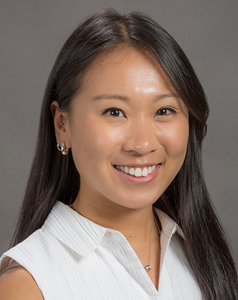 |
Joey Cheung, MAWhy UW Psychology Internship?I was drawn to the General Adult Track at UW because of the unique clinical and research opportunities that would allow me to reach the next stage in my professional development. Given my clinical and research interests on emotional and behavioral dysregulation, I was eager to build on my understanding of affective science to explore how multimodal techniques can translate into prevention and treatment for self-injurious thoughts and behaviors. The protected research time not only allows me to work on my dissertation but also allows me to develop research collaborations throughout the department. |
Clinically, UW provides the perfect training ground for someone who is interested in receiving generalist outpatient training in delivering person-centered EBPs to adults. The UW Outpatient Psychiatry Clinic provides me with unparalleled training and supervision in Dialectical Behavioral Therapy and other evidence-based psychotherapies (i.e., Cognitive Processing Therapy, CBT for Depression). With an interest in trauma-informed treatments, my one-day a week rotation at Harborview 5East gives me the opportunity to learn the Common Elements Treatment Approach (CETA), a novel transdiagnostic approach to trauma, depressive, and anxiety symptoms. Lastly, the clinical rotation at the Fred Hutchinson Cancer Research Center is allowing me to strengthen my training in delivering psychotherapy to cancer patients as part of an interdisciplinary psycho-oncology team.
Education
Clinical Rotations
Career GoalsMy career goal is to work as a clinical psychologist in an academic medical center where I can simultaneously partake in research and clinical practice, specifically working with patients who have complex presentations in emotional and behavioral dysregulation. Trained in a clinical-science model, my research informs my clinical practice as I explore the interaction between static (i.e., trait characteristics) and dynamic (i.e., affective states, physiology) facets of emotional dysregulation and its effects on SITB. With a background in multimodal assessments in affective science, I’m interested in integrating these approaches with use of technology to improve treatment efficacy and delivery for self-injurious thoughts and behaviors. Clinically, my philosophy is underscored by taking a person-centered but adherent use of evidence-based treatments with a balance between change and acceptance strategies to bring patients closer to living a values-consistent life. Follow me for a week!Sunday
Monday (OPC-DBT)
Tuesday (Research + OPC)
Wednesday (Harborview 5EC)
Thursday (OPC + Didactics)
Friday (FHCC)
Saturday
|
|
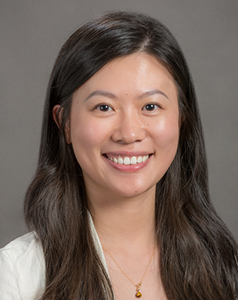 |
Daisy Hu, MS DBAWhy UW Psychology Internship?I was drawn to the UW Internship program because of the depth and breadth of clinical training and the emphasis on research. My graduate training solidified my interest in autism and neurodevelopmental disabilities. What I sought from the internship was to refine my specialization in neurodevelopmental disorders and extend my skills to better serve neurodivergent individuals and their families. I aim to gain additional training in diagnostic assessment, evidence-based interventions, inpatient care, research, and leadership development in a multidisciplinary setting. Thus, I was thrilled by the training offered in the Autism and Developmental Disabilities Track, as it best aligns with my internship goals. Additionally, I was also intrigued by the Seattle area and the work-life balance offered in the program! |
Education
Clinical Rotations
Career GoalsMy long-term goal is to become a bilingual pediatric psychologist proficient in both English and Mandarin. This career path is driven by my commitment to: (a) Promoting the well-being and vocational development of neurodivergent individuals; (b) Reducing inequities and disparities in the accessibility and quality of care; (c) Fostering multidisciplinary and international collaboration in autism clinical practice and research. My background, growing up in rural China, and my pursuit of specialized training in neurodevelopmental disorders in the U.S., have illuminated the significant disparities in autism awareness, patient care, and research. I aspire to become a scientist-practitioner, dedicated to delivering culturally competent care to under served communities, advancing the global scientific understanding of autism, and championing the vocational development of neurodivergent individuals. Follow me for a week!Sunday
Monday
Tuesday
Wednesday
Thursday
Friday
Saturday
|
|
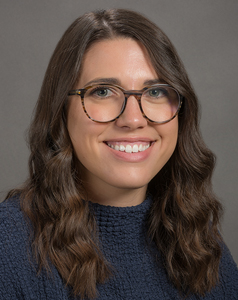 |
Megan Weishaar, MSWhy UW Psychology Internship?I was drawn to the UW Psychology internship for the opportunity to train in a Level 1 Trauma Center with a mission to serve underserved populations. I was eager to gain experience working in a variety of inpatient settings (i.e. ICU, post-acute care, inpatient rehabilitation) with a diverse array of rehabilitation diagnoses and presentations (i.e. TBI, SCI, stroke, limb loss and difference, chronic pain, burns, etc.) across the lifespan. The BMed track offers the opportunity to bolster skills in interdisciplinary communication, fast-paced assessment and intervention, and brief intervention, which I found to be meaningful to my development in this field. |
I was also drawn to the chance to bolster research skills during this clinical year, including participating in Grant Writing Seminar once a week. There are opportunities to engage in research with faculty who are conducting important work in Rehabilitation Psychology that has important implications for healthcare systems and improving health outcomes.
Education
Clinical Rotations
Career GoalsI am passionate about working in integrated medical settings on multidisciplinary teams serving patients with marginalized identities and complex medical and rehabilitation needs. I hope to be working in an academic medical center setting where I am able to see patients, conduct research, and engage in teaching, mentorship, and advocacy work. As I have progressed through training I have become increasingly passionate about Rehabilitation Psychology, and hope to become a board certified Rehabilitation Psychologist in the future. Follow me for a week!Sunday
Monday
Tuesday
Wednesday
Thursday
Friday
Saturday
|
|
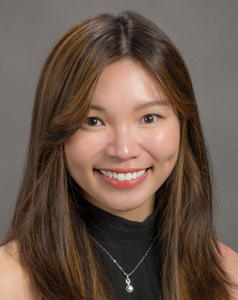 |
Jesslyn Li Shen Chong, MAWhy UW Psychology Internship?I was drawn to the UW psychology internship because of the breadth of experiences and rotations they have to offer. I was very excited to work in a child inpatient psychiatric facility setting and coordinate care within the context of consultation/liaison with patients with complex medical, trauma, developmental, and mental health problems. I will also be receiving more in-depth evidence-based intervention training, such as DBT and PC-CARE. I truly believe that these varied experiences would make me a well-rounded general child and adolescent clinical psychologist! |
| In addition to the clinical opportunities, UW also offers valuable research opportunities, such as being paired with a research mentor, dedicated research time, and a grantsmanship seminar. UW also values connecting trainees to different opportunities, as evidenced by an opportunity to connect with 21 faculties in a trainee-focused research development day. The varied research programs at UW help me to expand my research program and experiences. A big culture of mentorship and collaboration within UW inspires my growth as a clinician and researcher. Notably, Seattle Children’s Hospital has allocated additional professional development grants to support general child psychology residents’ growth and development in both clinical and research contexts.
In addition, the UW psychology internship promotes work-life balance and all general child track supervisors often emphasize the importance of self-care during internship. Lastly, Seattle is a great city with its beautiful natural surroundings, diverse cultural offering, and exciting activities, ranging from art, music, food, and camping to hiking. Being the explorer that I am, I am so grateful for the ability to indulge in many new activities and hobbies in Seattle. Education
Clinical Rotations
Career GoalsI envision myself having a career with a balance of clinical and research work. Clinically, I aim to provide comprehensive assessments and empirically based interventions for youth and their families. I also aim to conduct translational clinical research to understand how early life adversities and stress response systems influence health outcomes, with an overall goal of incorporating stress biomarkers as objective markers to assess the effectiveness of clinical interventions. I foresee myself working in a medical center/ academic health setting where I engage in clinical work, research, training, and supervision. Follow me for a week!Sunday
Monday
Tuesday
Wednesday
Thursday
Friday
Saturday
|
|
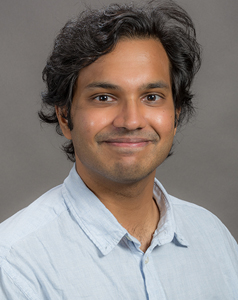 |
Deepan Guharajan, MSWhy UW Psychology Internship?I chose the UW Psychology Internship for a variety of reasons, the first of which was clinical fit: given my hope of being a rehabilitation neuropsychologist, I was excited at the opportunity to receive training across two clinical sites (i.e., University of Washington Medical Center-Montlake campus and Harborview Medical Center) that specialize in rehabilitation medicine. The unique ability to deliver neuropsychological care across inpatient and outpatient settings was exactly what I was looking for. |
Secondly, the internship’s strong commitment to valuing research development and endeavors at this early stage of career development was notable and an exception to most other sites. Lastly, the warmth, strong ideal to promote patient care, and genuine interest UW faculty expressed in me as a future clinician was apparent even during brief interviews solidified my intent to pursue internship here.
Education
Clinical Rotations
Career GoalsWhile still in its infancy, my career plans are to ultimately return to my home country of Malaysia, where I was born and raised. The strength and versatility of my graduate training (particularly here at UW) will prepare me for the multitude of roles and responsibilities I hope to serve patients with. To that end, I aim to provide theory informed, evidence-based, patient-centered neuropsychological care. Given the limited number of neuropsychologists in Malaysia, my hope is to become embedded within a traditional healthcare delivery model (e.g., rehabilitation center, academic hospital) to foster an appreciation among providers and patients alike on the unique role neuropsychology can serve. Moreover, I hope to stimulate and engage in neuropsychological research at home, where the absence of culturally-sensitive norms significantly may significantly limit the applicability and validity of test findings. Follow me for a week!Sunday
Monday
Tuesday
Wednesday
Thursday
Friday
Saturday
|
|